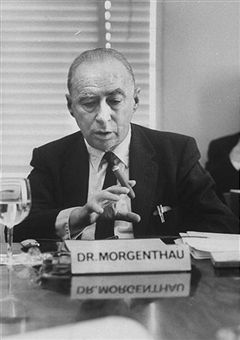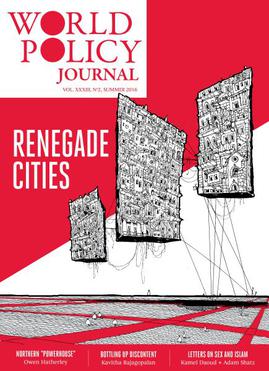
Samuel Phillips Huntington was an American political scientist, adviser, and academic. He spent more than half a century at Harvard University, where he was director of Harvard's Center for International Affairs and the Albert J. Weatherhead III University Professor.

The Council on Foreign Relations (CFR) is an American think tank specializing in U.S. foreign policy and international relations. Founded in 1921, it is an independent and nonpartisan nonprofit organization. CFR is based in New York City, with an additional office in Washington, D.C. Its membership has included senior politicians, numerous secretaries of state, CIA directors, bankers, lawyers, professors, corporate directors and CEOs, and senior media figures.

George Frost Kennan was an American diplomat and historian. He was best known as an advocate of a policy of containment of Soviet expansion during the Cold War. He lectured widely and wrote scholarly histories of the relations between the USSR and the United States. He was also one of the group of foreign policy elders known as "The Wise Men".

The "X Article" is an article, formally titled "The Sources of Soviet Conduct", written by George F. Kennan and published under the pseudonym "X" in the July 1947 issue of Foreign Affairs magazine. It widely introduced the term "containment" and advocated for its strategic use against the Soviet Union. It expanded on ideas expressed by Kennan in a confidential February 1946 telegram, formally identified by Kennan's State Department number, "511", but informally dubbed the "long telegram" for its size.

Hans Joachim Morgenthau was a German-American jurist and political scientist who was one of the major 20th-century figures in the study of international relations. Morgenthau's works belong to the tradition of realism in international relations theory; he is usually considered among the most influential realists of the post-World War II period. Morgenthau made landmark contributions to international relations theory and the study of international law. His Politics Among Nations, first published in 1948, went through five editions during his lifetime and was widely adopted as a textbook in U.S. universities. While Morgenthau emphasized the centrality of power and "the national interest," the subtitle of Politics Among Nations—"the struggle for power and peace"—indicates his concern not only with the struggle for power but also with the ways in which it is limited by ethical and legal norms.

Hamilton Fish Armstrong was an American journalist who is known for editing Foreign Affairs from 1928 to 1972.
Current History is the oldest extant United States-based publication devoted exclusively to contemporary world affairs. The magazine was founded in 1914 by George Washington Ochs Oakes, brother of The New York Times' publisher Adolph Ochs, in order to provide detailed coverage of World War I. Current History was published by the New York Times Company from its founding until 1936. Since 1942 it has been owned by members of the Redmond family; its current publisher is Daniel Mark Redmond.

David J. Rothkopf is an American foreign policy, national security and political affairs analyst and commentator. He is the founder and CEO of TRG Media and The Rothkopf Group, a columnist for The Daily Beast and a member of the USA Today Board of Contributors. He is the author of ten books including Running the World: The Inside Story of the National Security Council and the Architects of American Power, National Insecurity: American Leadership in an Age of Fear, and most recently, Traitor: A History of American Betrayal from Benedict Arnold to Donald Trump. He is also the podcast host of Deep State Radio. Rothkopf also serves as a registered foreign agent of the United Arab Emirates.

World Policy Journal was the flagship publication of the World Policy Institute, published by Duke University Press. Focusing on international relations, the publication provided left-wing, non-United States-centric perspectives to world issues. It contained primarily policy essays but also book reviews, interviews, and historical essays. Most articles were commissioned. The last print issue of the journal was published in Winter 2017.

Walter Russell Mead is an American academic. He is the James Clarke Chace Professor of Foreign Affairs and Humanities at Bard College and taught American foreign policy at Yale University. He was also the editor-at-large of The American Interest magazine. Mead is a columnist for The Wall Street Journal, a scholar at the Hudson Institute, and a book reviewer for Foreign Affairs, the quarterly foreign policy journal published by the Council on Foreign Relations.
Mark Falcoff is an American scholar and policy consultant who has worked with a number of think tanks, such as the American Enterprise Institute (AEI), the Hoover Institution, and the Council on Foreign Relations.
James Fulton Hoge Jr. was an American journalist and magazine publisher who was the editor of Foreign Affairs and the Peter G. Peterson Chair at the Council on Foreign Relations. His principal areas of expertise were U.S. foreign policy and international economic policy.
Joel H. Rosenthal is a scholar, teacher, and executive best known for his work in ethics and international affairs. He is currently president of Carnegie Council for Ethics in International Affairs. He lectures frequently at universities and public venues across the United States and around the world.[1]

International Affairs is a 100-year-old peer-reviewed academic journal of international relations. Since its founding in 1922, the journal has been based at Chatham House, the Royal Institute of International Affairs. It has an impact factor of 5.957 and a ranking of 6th in the world in International Relations journals, according to the 2021 ISI Journal Citation Reports. It aims to publish a combination of academically rigorous and policy-relevant research. It is published six times per year in print and online by Oxford University Press on behalf of Chatham House. In its 100-year history International Affairs has featured work by some of the leading figures in global politics and academia; from Mahatma Gandhi and Che Guevara to Joseph S. Nye and Susan Strange.

Gideon Rose is a former editor of Foreign Affairs and a member of the Council on Foreign Relations. He served as associate director for Near East and South Asian Affairs on the staff of the National Security Council from 1994 to 1995 under the Clinton Administration.

Jessica Eve Stern is an American scholar and academic on terrorism. Stern serves as a research professor at the Pardee School of Global Studies at Boston University. Earlier she had been a lecturer at Harvard University. She serves on the Hoover Institution Task Force on National Security and Law. In 2001, she was featured in Time magazine's series on Innovators. In 2009, she was awarded a Guggenheim Fellowship for her work on trauma and violence. Her book ISIS: The State of Terror (2015), was co-authored with J.M. Berger.

Michael E. Shifter is president of the Inter-American Dialogue and an adjunct professor of Latin American studies at Georgetown University's School of Foreign Service. He is a member of the Council on Foreign Relations and writes for the council's journal Foreign Affairs. He is also a member of the Latin American Studies Association (LASA), and a contributing editor to Current History.
Jussi M. Hanhimäki is a Finnish historian, specializing in the history of the Cold War, American foreign policy, transatlantic relations, international organizations and refugees.
Jonathan Tepperman is an author, journalist, and expert on international affairs. He is currently the Editor in Chief of The Catalyst and a Senior Fellow at the George W. Bush Institute. From 2017 to 2020 he was Editor in Chief of Foreign Policy. Before that he served as the Managing Editor of Foreign Affairs, and before that, as Deputy Editor of Newsweek International. His critically-acclaimed first book, The Fix, published in 2017, tells the stories of how countries around the world have solved some of the most difficult challenges.
Charles Frazer Hermann holds the Brent Scowcroft Chair in International Policy Studies at the George Bush School of Government and Public Service at Texas A&M University. He is an expert in matters relating to American foreign policy, crisis management, and decision-making.















